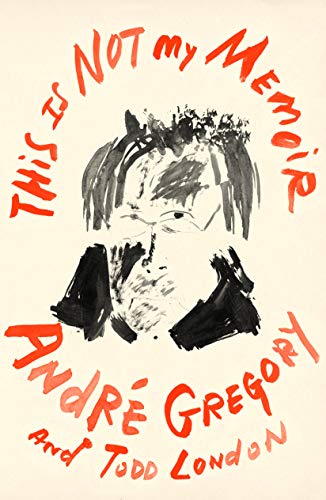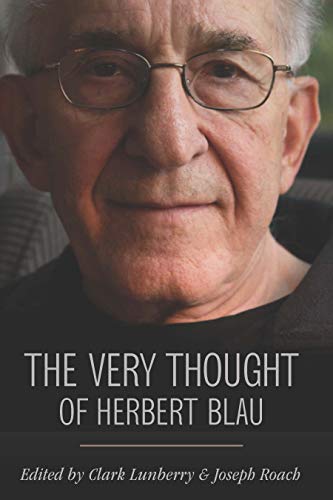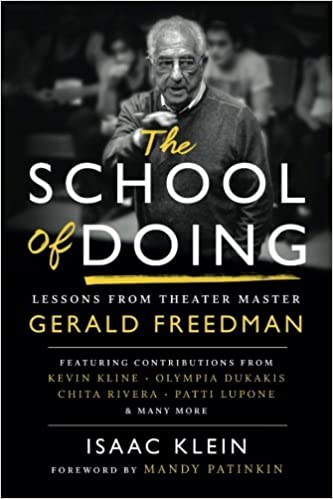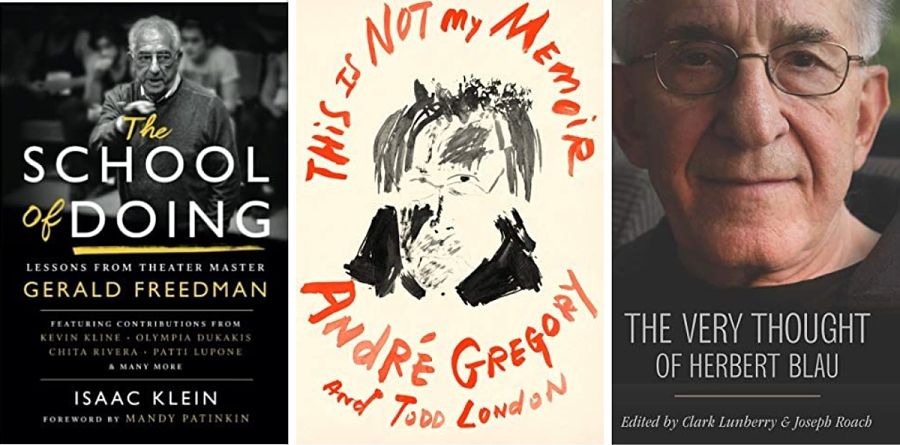There may be no luckier man of the theatre than André Gregory.

As he details in his new memoir, impishly titled This Is Not My Memoir, his father escaped Stalin and stayed just ahead of Hitler, carting a fortune out of Weimar and finagling the family out of Paris as the Germans invaded Poland. In New York City, André attended private school, and since his parents had little interest in parenting, he was brought up by a kindly nanny. They spent summers in a beautiful home on Sunset Strip rented from Thomas Mann. Marlene Dietrich introduced them to other celebs, while Toscanini and Heifetz sought his mother’s company. When Vladimir Horovitz was having a nervous breakdown, he and André’s mother would play gin rummy before dinner. Unable to perform publicly, Horovitz would sit at the piano and serenade the family. André’s love for words was born of watching Basil Rathbone record his weekly radio show The Sherlock Holmes Hour.
Good fortune would shine on his vocational life as well, up to a point. After Harvard—of course—Gregory landed at the prestigious Actors Studio, studying with Strasberg and Bobby Lewis. Strasberg eviscerated his first directing scene, yet somehow he would become Gregory’s “artistic father.”
With virtually no directing experience he was hired as associate artistic director at Seattle Rep. It took just one production, Firebugs—with a large trampoline, films of Hiroshima, and blowups of newspaper articles about Seattle scandals—to prompt his firing. Alan Schneider told him he needed his own company outside New York, so he started Theatre of the Living Arts in Philadelphia. In a continual rage over his absent father, he self-destructively programmed Rochelle Owens’ Beclch, featuring bestiality, cannibalism, and the odor of rotting flesh. The reviews were terrible, and his own board fired him.
A career ender? Not for André. Ted Kalem of Time wrote a rave, which made its way to Gregory Peck, who thought André was the perfect guy to run an interracial theatre in post-riot Watts, Los Angeles. When an exhausted André demurred, Peck leant him his house in Acapulco for as long as it took to get to yes. Starting his new gig with a production of Tartuffe so deadly that Eldridge Cleaver labeled it “Tar-tough,” Gregory offered to calm the waters with The Glass Menagerie, featuring a Black Gentleman Caller. During a heated argument over that casting choice, he writes that Peck slugged him.
Back in New York, he licked his wounds and neglected his wife and children. Out of the blue, the dean of the new Tisch School at NYU asked him to teach a workshop to the school’s first class of graduate actors. Reluctant at first to waste his talent on students, he found the work salubrious. After witnessing Acropolis and attending a rigorous workshop with Grotowski, he emerged a new man with an ensemble called the Manhattan Project. Their first production was Alice in Wonderland, with no scenery, one table, one light, and a talented ensemble. Alice was a hit, and one of theatrical highlights of the 1970s.
But his greatest stroke of luck came when he was searching for a playwright to adapt Peer Gynt, and he was introduced to Wallace Shawn. Instead of an Ibsen adaptation, Shawn handed Gregory the brilliantly scabrous Our Late Night, an unexpected success at the Public. Their relationship, later dramatized in the unexpected hit film My Dinner With André, would turn out to be one of the longest-running collaborations in the American theatre, and the ignition for the rest of his career.
Gregory’s memoir, written with Todd London, alights briefly on dozens of wildly picaresque episodes. The breathlessness of this highly entertaining read may leave readers wanting more, especially about his first marriage to the woman everyone called Chiquita, the rage he felt toward his parents, and the secret to what a director does with five years of rehearsal.
What provides ballast for the book is a search—through years of therapy, guru retreats, meditation, and studying Torah to find his Jewish roots—for “the André within the other André’.” It’s hard not to admire the man for, at the very least, his ability to get off the mat and get back to work. At 86, more Ibsen beckons.

In his early years, Gregory’s pilgrimage to theatre meccas included a stop at the Actors Workshop in San Francisco. Focusing much of its effort on the avant-garde of the 1950s—Beckett, Pinter, Brecht, Ionesco, and Genet—when hardly any other American troupe would do so, the workshop established a reputation as, in Richard Gilman’s appraisal, “the best, most adventurous permanent theatre group in the United States.” Led by two San Francisco State professors, Herbert Blau and Jules Irving, its accomplishments included Blau’s legendary Waiting for Godot, performed at San Quentin prison.
In 1964 Blau wrote a brave and salutary broadside condemning “the failure and fatuousness of American theatre.” The Impossible Theater was six times longer than The Communist Manifesto, but Gilman called it “a great purgative outburst of indignation and contempt.” Blau wrote: “There are times when confronted with the despicable behavior of people in the American theater, I feel like the lunatic Lear on the heath, wanting to ‘kill, kill, kill, kill, kill, kill!’” Though he would write 12 books, The Impossible Theater, marked also by acute interpretations of Beckett, was the one of consequence.
One of Lincoln Center Theater’s board members took notice of the book, and a year later Blau and Irving succeeded Elia Kazan and Robert Whitehead as the theatre’s directors. It was to be the turning point of Blau’s life. Rather than inaugurate their regime and the newly minted Beaumont Theater with one of the workshop’s triumphs, they gambled on a play extraordinarily difficult to master and unlikely to draw audiences: Büchner’s Danton’s Death. The critics buried it. A second Blau production was canceled when it consumed nearly an entire season’s budget. In less than two years Blau was gone.
His second act was a lamentable fall down the rabbit hole of theory as he wandered from one academic job to another. Aside from a brief foray directing a group at Oberlin College in the ’70’s, he stopped making theatre. Instead he cranked out arduous tomes that embraced one critical fad after another. In The Impossible Theater Gilman had noted Blau’s “absence of clarity due primarily to an inability to refrain from introducing everything he knows or feels or has read about a subject.” This did not stop academics from praising Blau’s allusive style and comparing him to Henry James.
The Impossible Theater introduced his penchant for apocalyptic cliché: “Existence is a mortal wound; Man is his own disease.” In a new collection about his life and career, The Very Thought of Herbert Blau, poet and critic Linda Gregorson, who acted under Blau at Oberlin, observes that “making theatre was his way of raging against death.” A favorite Blau saying was “the actor is dying before your very eyes.” To which another Oberlin actor, Julie Taymor, retorted: “The actors are living in front of your eyes. They are living and creating, they’re not dying!”
At Oberlin he declaimed, “I couldn’t care less about the audience. What I did care about was precisely what we were doing, on the premise that theatre is thought.” In the psychodrama-like rehearsals he grabbed the sweatshirt of the young Bill Irwin and yelled: “Why the fuck am I not a god?”
One of the great ironies of Blau’s career was that this pugnacious alpha male, who grew up a brawler in “the Jewish heart of Brooklyn” and raged at so much of the world, could fail to understand the emotional power of his chosen medium. In seminars, he contended that “students may engage with a play far more profoundly if they don’t go to a production…The brain is the best stage of all.” This is of course the old English department canard that theatre in the flesh corrupts the singular vision of the playwright (or the professor). Blau learned it at Stanford from his teacher Yvor Winters, who so despised theatre that he never once made the trip from Palo Alto to his student’s celebrated workshop.
The journey through the hell of professional failure brought Blau—who once defined theatre as the “public art of crisis,” and named the purpose of the workshop as being to “save the world”—to insist that “at some level, to do theatre, you also have to hate it.”
Credit is due to Clark Lunberry and Joseph Roach, the editors of The Very Thought of Herbert Blau, for assembling more than a mere tribute book. An interview with Taymor and one of Blau by Bonnie Marranca and Gautum Dasgupta challenge his thinking, especially his eventual antipathy toward theatre. Essays by S.E. Gontarski and Morton Sobotnick flesh out the talent and turmoil of a painfully conflicted man. And Sue Ellen Case’s hilariously self-serving essay offers half a dozen reasons why Blau will follow “the Ruby Cohns, Martin Esslins, John Willetts, and Eric Bentleys” into the 21st-century academic dustbin.
Still, long after Blau’s dalliances with the theory cult are forgotten, Actors Workshop will be remembered as one of the seminal theatres of the U.S. regional theatre movement.

The year Herbert Blau left Lincoln Center and André Gregory met Jerzy Grotowski, Gerald Freedman became artistic director of the New York Shakespeare Festival in Central Park. He’d already worked at the Delacorte and on Broadway, but his new role solidified what would become a fruitful three-decade relationship with Joseph Papp.
Known for his intelligent, balanced, and clear directing, Freedman also helped develop American actors who could execute a muscular Shakespeare for a wide outdoor setting that competed with passing aircraft and uncooperative weather. These young actors became a “rotating stock company” that included Colleen Dewhurst, Stacy Keach, Roscoe Lee Brown, Morgan Freeman, Sam Waterston, James Earl Jones, and eventually Meryl Streep, Kevin Kline, Blythe Danner, and Christine Baranski.
Freedman was the perfect man for the job because his directing was all about the actor. Mentored by greats from the Group Theatre, he was, like Kazan, “in there like a fighter.” Rather than a visionary, he was a common-sense problem solver with a fanaticism for acting truth. He asked actors the right questions and let them own the answers. He taught Chita Rivera to sing “A Boy Like That” from the heart and cajoled Patti LuPone to “dig deeper.” She did.
Equally adept at musicals and the classics, Freedman made theatre history when James Rado and Gerome Ragni brought him scraps of paper and a fresh vision that he took credit for shaping into the Public’s first major commercial hit, Hair.
Freedman learned his trade by being a dialogue director on a number of Hollywood movies, and most famously, coaching the actors on Jerome Robbins’s Broadway staging of West Side Story. Robbins had the vision, but Freedman knew how to translate it into acting terms.
The basics of Freedman’s technique were hardly original; most of it was borrowed straight from Harold Clurman. So the value of Isaac Klein’s book based on Freedman’s work, The School of Doing, is as a record of a deeply respected director and truly gifted teacher. “I learned more about playing Shakespeare from Jerry than anyone,” says Stacy Keach. Elizabeth Franz credits him for changing her life as an actor by teaching her “how to get out of the way and let things happen, naturally.” In his preface to the book, Mandy Patinkin calls Freedman “my artistic DNA.”
At Juilliard John Houseman brought Freedman in to draw out of technically proficient young actors an emotional life. No wonder: Known often to teach at high-decibel levels, he was inclined to bring more than a modest level of passion to the classroom.
Freedman’s career connects back not only to the Group but to the legendary Northwestern University teacher Alvina Krause, who reinforced in art what Freedman says he “learned from my Jewish parents in Lorain, Ohio: an unalloyed, irreducible, inflexible respect for integrity of execution in all things.”
Freedman’s last job was as dean of the North Carolina School of the Arts. In a labor of love, Klein, one of his students, worked with Freedman, though suffering aphasia from a stroke, to pull together notes, lectures, recordings, and interspersed testimonials from a remarkable roster of actors. It’s a worthy tribute to a man of the theatre who succeeded as splendidly in the classroom as he did in the rehearsal hall.
Michael Bloom is a director and the author of Thinking Like a Director and a new adaptation of Nathan the Wise, to be produced in 2021 in Washington, D.C.


